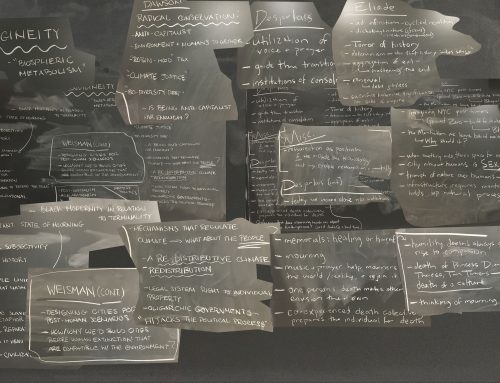Eric Klien Interview write-up:
Group 6: Ousmane, Armando, and Oscar
—
Our group asked two questions of Eric Klien. The first was whether he thought that the Lifeboat Foundation was constructing problems that aren’t yet real. In other words, we wondered if making disaster plans for an imagined problem works to create the problem in reality. This question was based on an idea from Bostrom’s essay “Existential Risks” about unknown subjective realities being just as risky as objective realities.
Mr. Klien, using Bostrom’s writings to help him elucidate his point, replied that Lifeboat’s “approach to existential risk cannot be one of trial and error. There are no trials … we must take proactive willingness to take decisive preemptive action. Since there are subjective risks that would have 100% mortality risks, we should take action to make sure these subjective risks don’t become objective realities”. Lifeboat’s philosophy to take “decisive preemptive action” seems good on the surface, especially if they are helping to create public disaster plans for certain extinction scenarios.
Unfortunately, Mr. Klien strayed from our original question of whether creating a public log some some extinction scenarios — and not others — works to manifest these extinction scenarios. Klien finished his answer to our question with the remark that “we live in a universe where there are no survivors, so you should do what you need to ensure your own survival”. Perhaps Klien believes that LIfeboat’s ledger of existential crises may push reality toward those crises, but if it does, members of Lifeboat will be more prepared to “ensure their own survival” than most.
Our second question was about Lifeboat’s strategies to get in front of people or organizations that can make their research possible for the long-term. Had they been in contact with organizations that possessed the ability to support their research? Which organizations had Lifeboat spoken with that helped them bolster their initiative?
Mr. Klien was most proud of Lifeboat’s large list of advisory board members, which he attributes to the National Institute of Health posting “the recipe” to the 1918 flu virus (linked here). This, he reported, spurred a lot of new members to start joining. The more board members that join, the better connected Lifeboat is, which helps them achieve goals faster, and get in touch with the right people for their initiatives.
Lifeboat’s biggest success in reaching influential organizations was when the US Navy contacted them for help with cyber security. Cyber security, he noted, is a big issue in modern governance. He finished his response with an anecdote about how Russia and Ukraine have been in a cyber-war for quite some time, during which Russian hackers shut down nearly all of the servers of one of Ukraine’s largest shipping company. Klien’s focus here was to imply that eventually, hackers will be able to sabotage the AI systems that we (humans) will come to depend on. And when they do, Lifeboat will be there with the disaster plan ready.

Recent Comments